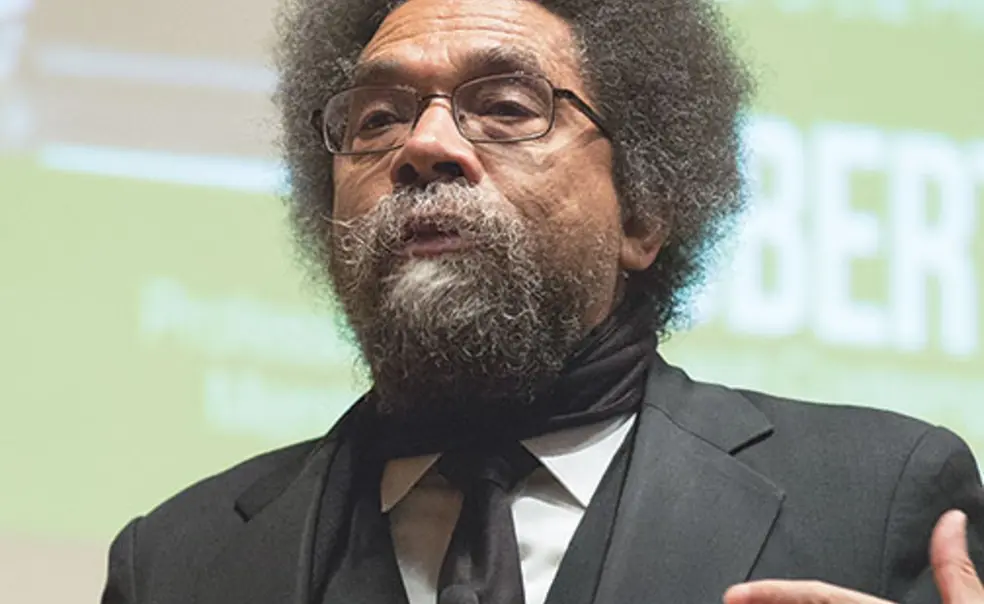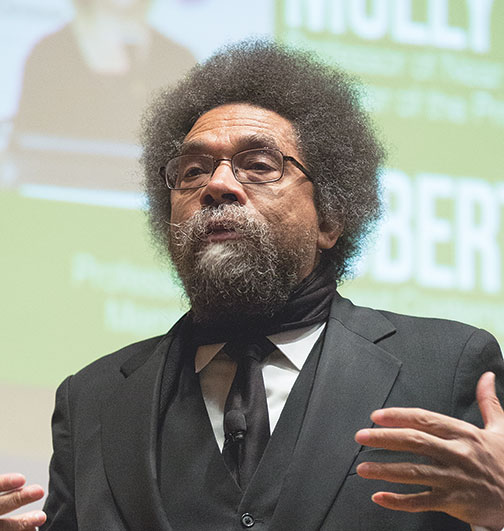Students Vote to Defeat Proposal Calling for Israel Divestment
Vigorous campaigns by both sides
After a three-day voting period, undergraduate students last month rejected a call for the University to divest from companies that are “complicit in the Israeli occupation of the West Bank and blockade of the Gaza Strip” by a 1,067–965 vote. About 39 percent of students voted.
Campaigning by both supporters and opponents of the referendum intensified in the weeks before the April 20–22 referendum, with online videos, Daily Princetonian ads and opinion pieces, and posters across the campus. Each side sponsored a panel of faculty and emeriti professors to bolster its case.
As undergraduates completed their voting, the Graduate Student Government scheduled a referendum for the following week on a similar divestment resolution. Voting results were not available for this issue of PAW.
Professors emeriti Cornel West *80 and Robert Tignor, along with professors Max Weiss and Molly Greene, journalist Max Blumenthal, and activist Larry Hamm ’78, participated in an April 8 panel organized by the Princeton Divests Coalition, the group that gathered the signatures necessary to bring the issue to a USG referendum.
“The occupation is immoral, it’s wrong, it’s unjust, it’s illegal, and it can only be pushed back,” West said. He said support for divestment is not anti-Semitism: “This has nothing to do whatsoever — ought to have nothing to do whatsoever — with the hatred of precious Jewish brothers and sisters. It’s the hatred of a system of domination, a hatred of a form of oppression.”
Hamm likened his efforts as a student activist against apartheid in South Africa to today’s Israel-divestment campaign. “The roles are reversed now,” he said. “The Israeli government is the Goliath; the Palestinian people are the little David,” he said. “[Palestinians] have a right to self-determination.”
The following week a panel sponsored by the No Divest campaign included professors Robert George, Melissa Lane, and Daniel Kurtzer (a former U.S. ambassador to Israel and Egypt); and Michael Walzer, professor emeritus at the Institute for Advanced Study and longtime co-editor of Dissent magazine.
“It is false to say that all opposition to Israel is driven by hatred of Jews,” George said. “But it is also false to say that none is.” He and other panelists noted that divestment campaigns were not being aimed at countries with human-rights records worse than Israel’s.
George cautioned against bringing politics into the way the University chooses its investments. “Once we establish the principle that the University can and should be acting based on political judgments,” he asked, “where does that stop?”
Kurtzer agreed, saying that pressuring the University to “become a tool for punitive measures” is a subversion of its role as a place for intellectual discussion and diversity.
The referendum followed votes on Israel divestment resolutions on a number of U.S. campuses, with varying results.
In November, a group of Princeton faculty members called on the University to divest from companies that “contribute to or profit from” Israel’s occupation of the West Bank. The Resources Committee of the Council of the Princeton University Community, which assesses divestment proposals, decided that the faculty petition did not meet guidelines for consideration because there was no consensus and sustained campus interest had not been demonstrated. Referendum supporters said they wanted to show consensus on the issue. The Prince, in an editorial, urged students to vote against the proposal.
Kelly Roache ’12, a member of Princeton Divests Coalition and an MPA student at the Woodrow Wilson School, said she would like the referendum to spur further campus activism. “The consciousness-raising education process leading up to the vote has the potential to be more transformative than the results of the referendum itself,” she said. “I hope it will render the occupation and human-rights violations in Palestine a more permanent facet of campus discourse.”
But Molly Reiner ’17, vice president of Tigers for Israel, warned of “great harm to our campus community if the University were to take a political stance on a topic on which a large portion of the campus disagrees.” Reiner said it would be more effective “to encourage students to come up with positive solutions to alleviate hardships in the region.”













1 Response
Sandy Kramer ’67
10 Years AgoDivestment Viewpoints
Regarding “Students Vote to Defeat Proposal Calling for Israel Divestment” (On the Campus, May 13), I have but one brief query: If Israel’s culture and politics manifest apartheid, how should Islamic dhimmitude be perceived?